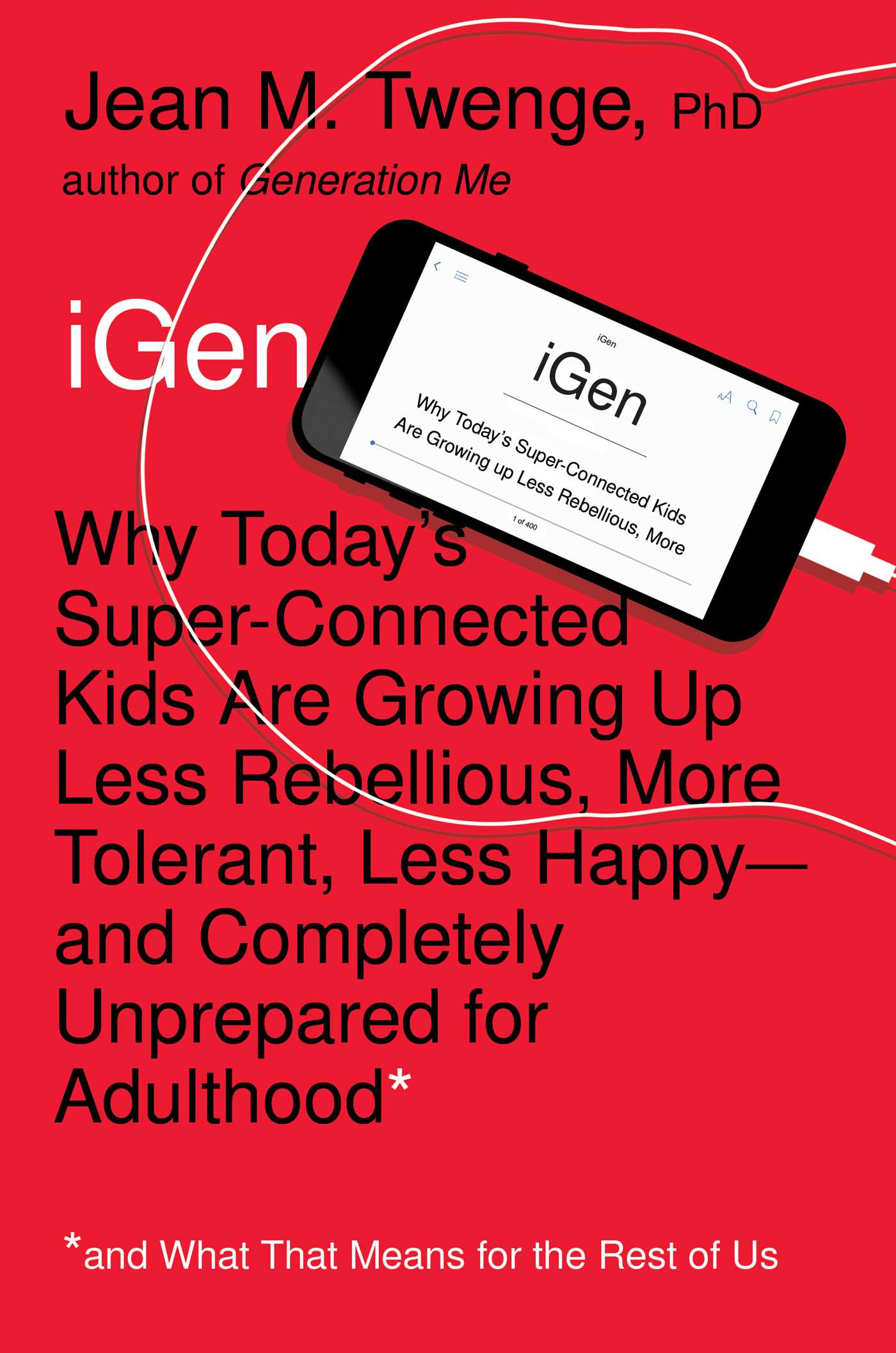Get our latest book recommendations, author news, and competitions right to your inbox.
iGen
Why Today's Super-Connected Kids Are Growing Up Less Rebellious, More Tolerant, Less Happy--and Completely Unprepared for Adulthood--and What That Means for the Rest of Us
Table of Contents
About The Book
With generational divides wider than ever, parents, educators, and employers have an urgent need to understand today’s rising generation of teens and young adults. Born in the mid-1990s to the mid-2000s and later, iGen is the first generation to spend their entire adolescence in the age of the smartphone. With social media and texting replacing other activities, iGen spends less time with their friends in person—perhaps why they are experiencing unprecedented levels of anxiety, depression, and loneliness.
But technology is not the only thing that makes iGen distinct from every generation before them; they are also different in how they spend their time, how they behave, and in their attitudes toward religion, sexuality, and politics. They socialize in completely new ways, reject once sacred social taboos, and want different things from their lives and careers. More than previous generations, they are obsessed with safety, focused on tolerance, and have no patience for inequality. iGen is also growing up more slowly than previous generations: eighteen-year-olds look and act like fifteen-year-olds used to.
As this new group of young people grows into adulthood, we all need to understand them: Friends and family need to look out for them; businesses must figure out how to recruit them and sell to them; colleges and universities must know how to educate and guide them. And members of iGen also need to understand themselves as they communicate with their elders and explain their views to their older peers. Because where iGen goes, so goes our nation—and the world.
Product Details
- Publisher: Atria Books (October 17, 2017)
- Length: 352 pages
- ISBN13: 9781501151989
Raves and Reviews
Named one of the "Best Tech Books of 2017" by Wired Magazine
“We’ve all been desperate to learn what heavy use of social media does to adolescents. Now, thanks to Twenge’s careful analysis, we know: It is making them lonely, anxious, and fragile—especially our girls. If you are a parent, teacher, or employer, you must read this fascinating book to understand how different iGen is from the millennials you were just beginning to figure out.”
– Jonathan Haidt, NYU-Stern School of Business, author of The Righteous Mind
“Jean Twenge collates the data on a generation and not only surprises readers with astonishing discoveries, but also helps us to make sense of what to do with those discoveries. This book is a must-read for anyone interested in understanding students.”
– Dr. Tim Elmore, author of Marching Off the Map, President of GrowingLeaders.com
“The reigning expert on generational change weighs in on the iGen, making a case for dramatic changes in just the last five years. Few accounts have seemed more sensational, and few have seemed more true.”
– Lisa Wade, PhD, author of American Hookup: The New Culture of Sex on Campus
"This book is a game-changer. If you want to understand how to parent, teach, recruit, employ, market to, or win the vote of anyone born between 1995-2012, you need to read this book. iGen will change the way you think about the next generation of Americans."
– Julianna Miner, Professor of Public Health, George Mason University
"Dr. Twenge brings to light, with longitudinal scientific data and personal interviews, a generation that is truly unique. An easy and scientifically informative read.”
– Larry D. Rosen, Ph.D., Professor Emeritus and author of 7 books on the impact of technology including The Distracted Mind: Ancient Brains in a High-Tech World (with Adam Gazzaley, MD, Ph.D., MIT Press, 2016)
“Stocked with valuable insights, iGen is a game changer and this decade’s ‘must read’ for parents, educators and leaders. Her findings are riveting, her points are compelling, her solutions are invaluable.”
– Michele Borba, Ed.D., Educational Psychologist and author of UnSelfie: Why Empathetic Kids Succeed in Our All-About-Me World
“Jean Twenge is the ultimate authority in generational differences who has been at the forefront of many trends. Her latest book iGen charts the surprising new normal of the current generation. It's a must read for anyone who is interested in young people and technology, filled with fascinating data that shines a light on many unique aspects of youth today.”
– Yalda T Uhls, author of Media Moms and Digital Dads: A Fact-Not-Fear Approach to Parenting in the Digital Age
“We all have impressions about the newest crop of teens and emerging adults, but what really is going on? Jean Twenge is the expert in the use of normative data, collected in systematic surveys over the years, to understand how the experiences, attitudes, and psychological characteristics of young people have changed over generations. Rigorous statistical analyses, combined with insightful interviews and excellent writing, create here a trustworthy, intriguing story.”
– Peter Gray, Research Professor of Psychology at Boston College and author of Free to Learn: Why Unleashing the Instinct to Play Will Make Our Children Happier, More Self-Reliant, and Better Students for Life.
“iGen is a monumental scientific study, and it reveals astonishing conclusions about today’s emerging adults. If you’re interested in unpacking the habits and the psyche of America’s future, start with this book!"
– Eli J. Finkel, author of The All-Or-Nothing Marriage
“A new look at the next generation. . . surprising.”
– Time
"The convergence of these diverse personal narratives with the data analysis lends a compelling sense of authority to the work...Technology in the last 30 years has not simply changed American culture, but transformed it. Twenge's book is a wake-up call and poses an essential question: Where do we go from here?"
– Chicago Tribune
Resources and Downloads
High Resolution Images
- Book Cover Image (jpg): iGen Hardcover 9781501151989
- Author Photo (jpg): Jean M. Twenge Photograph by Pam Davis(0.1 MB)
Any use of an author photo must include its respective photo credit









